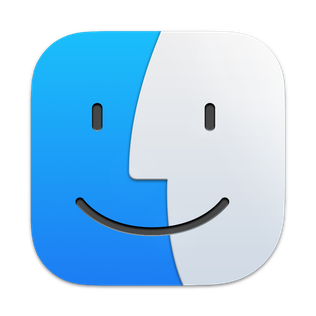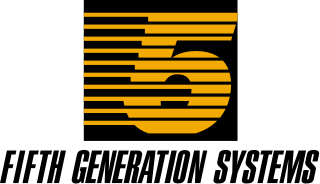Related Research Articles

The Finder is the default file manager and graphical user interface shell used on all Macintosh operating systems. Described in its "About" window as "The Macintosh Desktop Experience", it is responsible for the launching of other applications, and for the overall user management of files, disks, and network volumes. It was introduced with the first Macintosh computer, and also exists as part of GS/OS on the Apple IIGS. It was rewritten completely with the release of Mac OS X in 2001.
Macworld/iWorld was an information technology trade show with conference tracks dedicated to Apple's Mac platform. It was held annually in the United States during January. Originally Macworld Expo and then Macworld Conference & Exposition, the gathering dates back to 1985. The conference was organized by International Data Group (IDG), co-publisher of Macworld magazine.
iDVD is a discontinued Mac application made by Apple, which can be used to create DVDs.

System 7, codenamed "Big Bang", and renamed Mac OS 7 since version 7.6, is the main operating system for Macintosh computers from Apple Computer. It succeeded System 6 upon launch on May 13, 1991, and new features since then include virtual memory, personal file sharing, QuickTime, QuickDraw 3D, and an improved user interface.

Andrew Jay Hertzfeld is an American software engineer who was a member of Apple Computer's original Macintosh development team during the 1980s. After buying an Apple II in January 1978, he went to work for Apple Computer from August 1979 until March 1984, where he was a designer for the Macintosh system software. Since leaving Apple, he has co-founded three companies: Radius in 1986, General Magic in 1990, and Eazel in 1999. In 2002, he helped Mitch Kapor promote open source software with the Open Source Applications Foundation. Hertzfeld worked at Google from 2005 to 2013, where in 2011, he was the key designer of the Circles user interface in Google+.

System 6 is a graphical user interface-based operating system for Macintosh computers, made by Apple Computer. It was released in 1988, and is part of the classic Mac OS series. It is a monolithic operating system, with cooperative multitasking based on an improved MultiFinder. The boxed version cost US$49, and it was included with all new Macintosh computers until 1991, when it was succeeded by System 7.

Mac OS X 10.0 is the first major release of Mac OS X, Apple's desktop and server operating system. It was released on March 24, 2001, for a price of $129 after a public beta.
SuperCard is a high-level development environment that runs on Macintosh computers, under OS 8 and 9, and OS X. It is inspired by HyperCard, but includes a richer language, a full GUI toolkit, and native color.

Rhapsody is an operating system that was developed by Apple Computer after its purchase of NeXT in the late 1990s. It is the fifth major release of the Mach-based operating system that was developed at NeXT in the late 1980s, previously called OPENSTEP and NEXTSTEP. Rhapsody was targeted to developers for a transition period between the Classic Mac OS and Mac OS X. Rhapsody represented a new and exploratory strategy for Apple, more than an operating system, and runs on x86-based PCs and on Power Macintosh.
The Apple community is a group of people interested in Apple Inc. and its products, who report information in various media. Generally this has evolved into a proliferation of websites, but latterly has also expanded into podcasts, either speculating on rumors about future product releases, simply report Apple-related news stories, or have discussions about Apple's products and how to use them.
Disinfectant was a popular antivirus software program for the classic Mac OS. It was originally released as freeware by John Norstad in the spring of 1989. Disinfectant featured a system extension that would detect virus infections and an application with which users could scan for and remove viruses. New versions of Disinfectant were subsequently released to detect additional viruses. Bob LeVitus praised and recommended Disinfectant in 1992. In May 1998, Norstad retired Disinfectant, citing the new danger posed by macro viruses, which Disinfectant did not detect, and the inability of a single individual to maintain a program that caught all of them.

3 in Three is a 1989 metapuzzle video game designed by Cliff Johnson and published by Cinemaware and Inline Design.
The Talking Moose is an animated talking utility for the Apple Macintosh. It was created in 1986 by Canadian programmer Steven Halls. It is the first animated talking agent on a personal computer and featured a moose that would appear at periodic intervals with some joke or witticism. The moose would also comment on system events and user actions and could speak what a user typed using the Moose Proof desk accessory.
The System suitcase is one of two essential files that make up the classic Mac OS, the other being the Macintosh Finder. If either file is missing or corrupted, a Macintosh may display a blinking question mark when booting. The suitcase is located in the System Folder, like the Finder file, and contains keyboard layouts, FKEY resources, cursors, icons, sounds, and, in System 6, bitmap fonts, and desk accessories. Mac OS only supports one System file; the presence of more than one System file on a hard disk is likely to cause system instability.

EyeTV is a European brand of TV tuners that allow users to watch TV on various devices including computers and smartphones. The brand was introduced in 2002 by Elgato Systems and was sold to Geniatech in 2016.
Donald M. Brown is a programmer and the creator of Eamon, a long-running non-commercial role-playing game series for the Apple II computer first released in 1980.
The Mac OS nanokernel is an operating system kernel serving as the basis of most PowerPC based system software versions 7 through 9 of the classic Mac OS, predating Mac OS X.

Fifth Generation Systems, Inc., was a computer security company founded October 1984 in Baton Rouge, Louisiana, United States by Robert Mitchell, Leroy Mitchell, Roger Ivey, and Bruce Ray. All four later left the company after it was acquired by Barry Bellue who was accused by the founders of fraud and continued theft from company accounts for illegal personal use. Fifth Generation's initial commercial product was FastBack, an early competitor to The Norton Backup from Symantec.

The Mac, short for Macintosh, is a family of personal computers designed and marketed by Apple Inc. The product lineup includes the MacBook Air and MacBook Pro laptops, and the iMac, Mac Mini, Mac Studio, and Mac Pro desktops. Macs are sold with the macOS operating system.
Scott Knaster is an American technical writer who has written many books, mostly dealing with Macintosh programming and using the Macintosh. He has worked for such companies as Apple Inc., General Magic, Microsoft, Danger Inc., and Google.
References
- 1 2 3 4 5 6 7 Hawkins, Lori (September 11, 1995). "The doctor is in demand". Austin American-Statesman . p. C1-C2. Retrieved 9 May 2023.
- ↑ Sellers, Dennis. "Still more speakers named for MacMania cruise". Macworld. Retrieved 9 May 2023.
- ↑ Quistgaard, Kaitlin. "MacWEEK Squeezed?". Wired. Retrieved 9 May 2023.
- ↑ Cruikshank, Jeffrey L. (6 January 2006). The Apple Way. McGraw Hill Professional. p. 127. ISBN 978-0-07-148315-5.
- ↑ Hafner, Katie (2 May 2005). "Apple's book ban leads to bigger print run". The New York Times. Retrieved 9 May 2023.
- ↑ "New & Noteworthy: Apple trade-up compared; MacCentral columnists gone?; MacFixIt Email List down; more". CNET. Retrieved 9 May 2023.
- ↑ "MacLive Conference coming to New York City". Macworld. Retrieved 9 May 2023.
- ↑ Sellers, Dennis. "Pogue, LeVitus, Woz to speak at upcoming events". Macworld. Retrieved 9 May 2023.
- ↑ Hayes, David (8 May 2001). "Mac group to meet". The Kansas City Star. p. D11. Retrieved 9 May 2023.
- ↑ Dalrymple, Jim. "MacMania II sets sail from Hawaii". Macworld. Retrieved 9 May 2023.
- ↑ Breen, Christopher. "Nuts to you". Macworld. Retrieved 9 May 2023.
- ↑ "Macworld Expo remembered". CNET. Retrieved 9 May 2023.
- ↑ "Macworld Expo NY 1998: My Conference session". CNET. Retrieved 9 May 2023.
- ↑ "Apple users want lower prices and a new mouse". The Burlington Free Press . Associated Press. 9 January 2000. p. 3E. Retrieved 9 May 2023.
- ↑ McNulty, Scott. "Meet the speakers at Macworld Boston". Engadget. Retrieved 9 May 2023.
- ↑ LeVitus, Bob (2 July 2022). "After 26 years, Dr. Mac signs off". Houston Chronicle . Retrieved 9 May 2023.
- ↑ LeVitus, Bob (July 1, 2022). "My Penultimate Column". The Mac Observer. Archived from the original on July 9, 2022. Retrieved 9 May 2023.
- ↑ LeVitus, Bob. "About". Dr. Mac's Website.